NPDES Annual Report
National Pollutant Discharge Elimination System
MS4 Permit No. NE0133671
Annual Report Summary September 1, 2022 – August 31, 2023
City of Lincoln, Nebraska
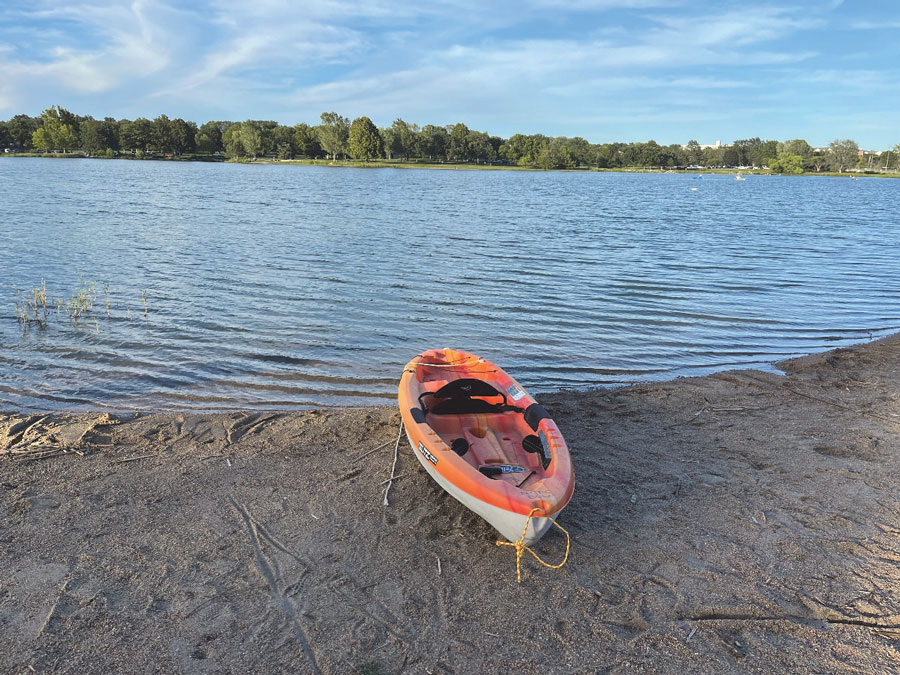 Lincoln Transportation and Utilities teammates kayaked and removed 37 pounds of trash from Holmes Lake with the Nebraska Game and Parks Commission August 15, 2023.
Lincoln Transportation and Utilities teammates kayaked and removed 37 pounds of trash from Holmes Lake with the Nebraska Game and Parks Commission August 15, 2023.
Submitted By: Lincoln Transportation and Utilities | Watershed Management Division
Prepared By: Shannon Ideus, Senior Environmental Health Specialist
Reporting Requirements Summary
The City of Lincoln is required by federal law to comply with the provisions of the Federal Clean Water Act. In Nebraska, the U.S. Environmental Protection Agency has given the Nebraska Department of Environment and Energy (NDEE) the authority to implement the conditions of the Clean Water Act and the responsibility to ensure municipalities in Nebraska are compliant.
The City of Lincoln complies with these mandated regulations through a State-issued National Pollutant Discharge Elimination System (NPDES permit (PDF, 2MB)). On October 2, 2018, the City was re-issued an NPDES permit by the State of Nebraska, allowing municipal stormwater discharges to local waterways and lakes effective November 1, 2018 – October 31, 2023.
(PDF, 2MB)). On October 2, 2018, the City was re-issued an NPDES permit by the State of Nebraska, allowing municipal stormwater discharges to local waterways and lakes effective November 1, 2018 – October 31, 2023.
This is a summary of the City’s efforts reported to the NDEE for the period beginning 9/1/22 to 8/31/23. The reporting period is reflective of the permit, signed on October 2nd, 2018, by the Water Permits Division Administrator. The current permit expired October 31, 2023. The City’s NPDES Permit has been administratively extended effective November 1, 2023, until a new permit is issued by the State.
Note: The City’s fiscal year, which ended August 31, 2023, is slightly different than the NPDES permit year 2023, which ends December 31, 2023.
The following is a list of programs the city has implemented to comply with the State’s requirements for Lincoln’s municipal stormwater NPDES permit.
Each program (numbered 1-8) contains a link to an EPA website to provide a summarized description of the requirements.
The items listed below are non-inclusive of all efforts made by the city in the 2022-23 fiscal year.
In this permit year, Parks and Recreation provided several programs for elementary school students and the general public. Educational focus was on the positive and negative impacts humans have on the environment.
Attendance of outdoor exhibits, various onsite programs and hiking events consisted of 161,425 students and their adult leaders.
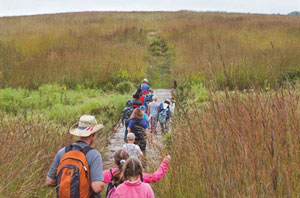 Pioneers Park Nature Center Activity Hike
Pioneers Park Nature Center Activity Hike
Watershed Management and Solid Waste teamed up and had two booths at the Spring Expo (Home Show) the weekend of February 11, 2022.
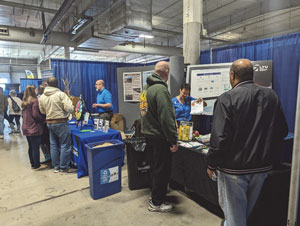 Joint Watershed/Recycling/Health Booth at Home & Garden Show in Lincoln, NE
Joint Watershed/Recycling/Health Booth at Home & Garden Show in Lincoln, NE
The event was well attended with approximately 700 attendees. Staff interactions consisted of various topics including, but not limited to recycling, composting, trash pickup and only rain in the drain activities.
Additionally, a kid’s corner education activity was conducted at the same event by the Watershed and Solid Waste educators to actively involve kids interested in environmental impact.
 Kids Corner Event included an activity regarding the importance of planting native wildflowers by Solid Waste
Kids Corner Event included an activity regarding the importance of planting native wildflowers by Solid Waste
The City made 2,160 cubic yards of compost available free to the public, previously known as “LinGro,” now referred to as “Earthfuel” Compost.
The city requires a “No Dumping – Drains to Creek” design imprint into all new precast concrete top sections of storm drains and manhole covers. The goal of the Storm Water Awareness Program is to prevent anything other than clean water from entering storm drains. Volunteers are also recruited to mark older storm drains with a “No Dumping - Drains to Creek” message. During the year, 202 storm drains were marked through the SWAP (Stormwater Awareness Program).
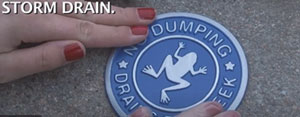 Keep Lincoln Lancaster County Beautiful works with volunteer groups to install Storm Drain Markers on area inlets
Keep Lincoln Lancaster County Beautiful works with volunteer groups to install Storm Drain Markers on area inlets
The City of Lincoln implemented an online “See Click Fix” program for citizens to report issues of concern. One of the items is “Mud in the Street Due to Construction.”
Complaints about mud in the street and/or right of way are generally in direct correlation with local construction. Inspectors verify the address of the complaint, if it correlates with a permitted site, it is not only followed up in See Click Fix, but also addressed through the proper enforcement procedures of the permit.
See Click Fix items are to be acknowledged within 24 hours and addressed within ten days. For this permit term staff followed up on 78 “mud in the street” complaints.
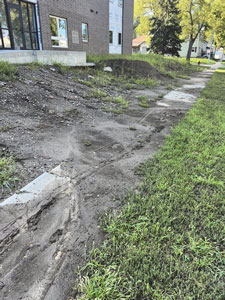 Mud in Street/ROW Complaint in Lincoln NE
Mud in Street/ROW Complaint in Lincoln NE
Removing trash from and adjacent to our local streams meets not only the public engagement permit requirement, but also qualifies as a water quality improvement.
Watershed enlists local citizens to remove trash from our streams/creeks/waterways. We continually add new streams into the Adopt a Stream program, which correlates the upward trend in volunteer numbers. This year 220 volunteers took part in 26 Adopt A Stream clean up events and removed a total of 7,375 pounds of trash from our local waterways.
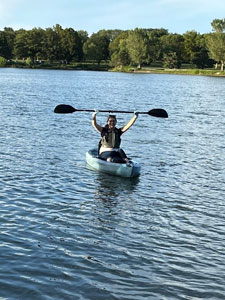 Local Residents Help Remove Trash from Area Streams
Local Residents Help Remove Trash from Area Streams
Approximately 6,551 tons of recyclable materials were collected through the City/County Consumer Recyclables Collection Sites in Fiscal Year 2022-23. Items included: newspapers, paper, cardboard, glass, tin, and aluminum cans. This program was associated with the City of Lincoln’s Waste Reduction and Recycling Program.
The Mayor’s office promoted an internship program called the Mayor’s Youth Employment Program (MYEP) where local high school and college students had the opportunity to gain job experience by working with City Agencies.
The internship allowed students to gain experience in the hiring/interview process, attend weekly meetings regarding their learning experiences, and gain valuable work experience in areas they may have not considered for future employment.
 Mayor’s Youth Employment Program (MYEP)
Mayor’s Youth Employment Program (MYEP)
Watershed Management was fortunate to have a talented student from Lincoln High School (LHS) that was interested in science, technology, engineering, and mathematics (STEM) study, field sampling and monitoring. The student stated one of the highlighted experiences for her was being able to actively participate in the follow up of an illicit discharge of reported foam in salt creek. The investigation involved a multi-Department response which included staff from Health, Watershed Management, Street Maintenance and Lincoln Wastewater. The source of the illicit discharge was eventually found, and the discharge was resolved.
The LHS student actively participated in Uncle Sam Jam for the July 4th Celebration. She came up with her own activity for water quality by engaging the public in a scavenger hunt. She was also interviewed by channel 10/11 for the Oak Lake Cleanup.
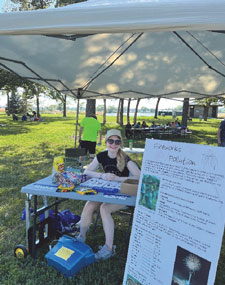 Lincoln High Student conducting scavenger hunt at Uncle Sam Jam
Lincoln High Student conducting scavenger hunt at Uncle Sam Jam
To educate the public on clean waterways, Watershed Management and Keep Lincoln and Lancaster County Beautiful work together to publish online social media campaigns to promote proper disposal of fireworks debris, pet waste and other hazardous materials.
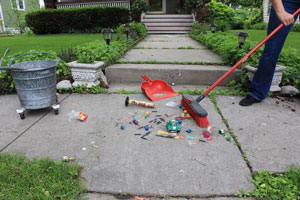 Proper disposal of fireworks debris is important for the environment.
Proper disposal of fireworks debris is important for the environment.
Every year, Watershed Management hosts a cleanup at Oak Lake Park following the City of Lincoln’s Fourth of July Celebration (aka Uncle Sam Jam). Volunteers come to the park to help pick up litter, keeping it out of our lakes and streams.
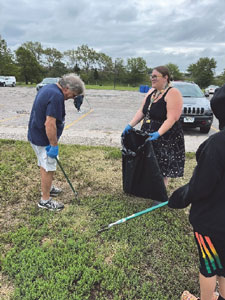 Volunteers picking up trash.
Volunteers picking up trash.
Unfortunately, single-use plastics are among the most common items found during the cleanup. To address this issue, Solid Waste/Watershed Management provided reusable water bottles (purchased via grant money) at Uncle Sam Jam. These reusable water bottles replaced the bottled water, eliminating this commonly littered item at its source. None of the reusable water bottles were found on the ground (or in the trash cans) during the cleanup. This means people took the reusable water bottles home with them.
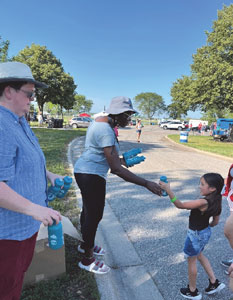 Recycling Staff handed out reusable water bottles purchased with grant funds.
Recycling Staff handed out reusable water bottles purchased with grant funds.
In the Summer-Fall seasons of 2022-23 the dry weather team monitored 51 outfall sites in Lincoln (including one revisit from 2022). A total of 18 samples were collected at sites that were found to have flow to detect potential illicit and illegal connections to the storm drain system. Monitoring locations shown in Figure 1 (PDF, 786KB).
(PDF, 786KB).
The Lincoln Lancaster County Health Department (LLCHD) investigated 109 reports of illicit discharges, with 82 of those being immediate responses by LLCHD’s HazMat Emergency Response Team due to reports as having actual water impact or the potential to impact water. The Health Department conducts investigations and enforcement for HazMat responses as appropriate (some locations are shown on Figure 2 (PDF, 923KB)).
(PDF, 923KB)).
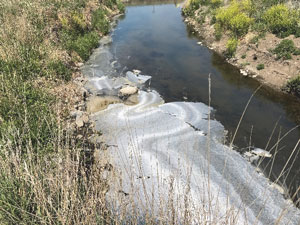 Illicit Discharge in Salt Creek
Illicit Discharge in Salt Creek
Examples of illicit discharges include vehicles leaking fuel, oil, or other fluids; paint washed out of brushes or rollers at the curb; grease discharges from restaurants; grey water or wastewater discharges; antifreeze and other chemicals spilled, dumped, poured or power washed into the storm drain system; and garbage junk and litter.
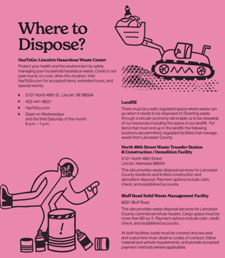 Educating the public on where to dispose of hazardous material can save tax dollars
Educating the public on where to dispose of hazardous material can save tax dollars
LLCHD and Lincoln Fire and Rescue’s actions minimize the contamination of water. Responsible parties are required to clean up the illicit discharge. If no responsible party is identified, LLCHD’s response contractor conducts the cleanup.
(Some locations are shown on Figure 2 (PDF, 923KB)).
(PDF, 923KB)).
The Watershed Management Division maintains a database for tracking permits for construction site activity. All of the inspections conducted by Watershed Management were logged in a database and mapped (see Figure 3 (PDF, 900KB)).
(PDF, 900KB)).
For the permit period 9-1-2022 through 8-31-2023 there were 3,674 inspections of small sites (under an acre) and 801 inspections of large sites (an acre or greater).
In addition to on-site education, annual training is provided to contractors apprising them of permit requirements, and changes to the same. Information regarding the annual training is available online at lincoln.ne.gov/ErosionSeminar.
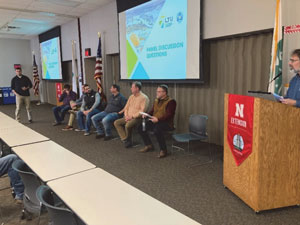 Training is provided to site contractors and developers
Training is provided to site contractors and developers
Watershed staff conducted 212 inspections of Retention/Detention Ponds to assess their functionality with regard to reducing pollutants from stormwater run-off and flood control (locations shown on Figure 8 (PDF, 866KB)).
(PDF, 866KB)).
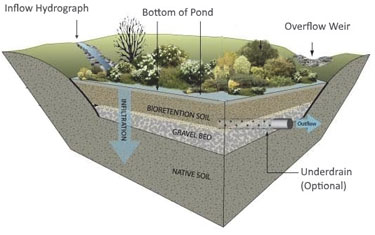 Retention Pond Diagram
Retention Pond Diagram
Additionally, 76 Post Construction BMP sites were inspected, and 21 new Post Construction Best Management Practice (BMP) applications were reviewed by staff.
The Flood and Water Quality Protection Manual (formerly the Drainage Criteria Manual) was updated in March 2023 after numerous public meetings, city council approval and community collaboration. This handbook establishes minimum requirements and criteria for the planning and design of the City of Lincoln’s urban stormwater systems. The criteria establish guidelines, standards, and methods for sound planning and design. The City of Lincoln may waive these guidelines or provide exceptions or variances to the guidelines in the interest of the health, safety, convenience, order, and general welfare of the community.
Implementing the guidelines contained in this manual protects the general health, safety, and welfare of the citizens of the City and educates them on the importance of stormwater management. Additionally, the manual contains guidelines for the protection of property in the City and provides recommendations for the City to work collaboratively and cooperatively with the development / building / engineering community to ensure compliance with National Pollutant Discharge and Elimination System (NPDES) permit requirements, to minimize future operation and maintenance costs, and to find equitable ways to fund the overall stormwater management process.
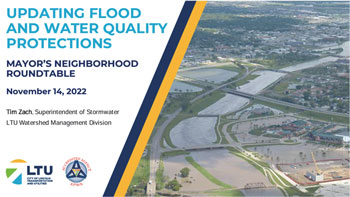 Flood and Water Quality Protection Meetings
Flood and Water Quality Protection Meetings
All curbed streets are swept annually, at a minimum. Additional sweeping occurs on arterial and residential streets in high debris zones to reduce litter and pollutants from entering the storm drain system. Sweeping activities shall follow LTU’s street sweeping operating procedure.
A total of 9,077 Residential Streets (lane miles) were cleaned, 6,644 curb miles of Arterial Streets and 754 Business District curb miles were also swept.
The combined street sweeping of all types of streets listed above produced 2,864 tons of material taken to the landfill. This material would have ended up in local streams, creeks and retention ponds if not collected by street sweepers.
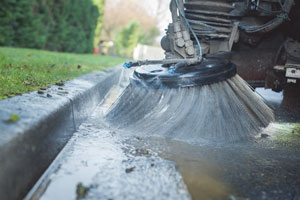 The City of Lincoln and Downtown Lincoln Association sweep streets in Lincoln, NE.
The City of Lincoln and Downtown Lincoln Association sweep streets in Lincoln, NE.
Downtown Lincoln Association also conducted sweeping of the sidewalks in the downtown business district, targeting those areas known for abundant trash accumulation. Approximately 1,425 cubic yards of debris/trash is collected annually.
City crews inspected manholes, inlets, and piped storm drainage systems to ensure that the city storm drain system is in good repair and that no sanitary lines connect to them.
The City was able to purchase a new vactor truck to clean out city owned water quality infrastructure.
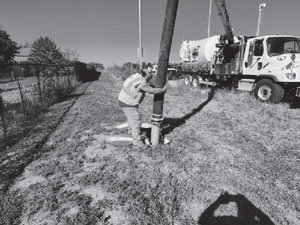 New vactor truck purchased in 2023 in operation.
New vactor truck purchased in 2023 in operation.
In this permit term, 9,795 linear feet of storm drainpipe was improved/replaced with the following storm drain improvement projects: Forest Lake, Rokeby from Friedman to 84th, Folsom from Old Cheney to Palm Canyon, Holdrege from 87th to Cedar Cove, Holdrege at 104th, 70th & A, West A from SW 23rd to SW 5th and A from 89th to 93rd.
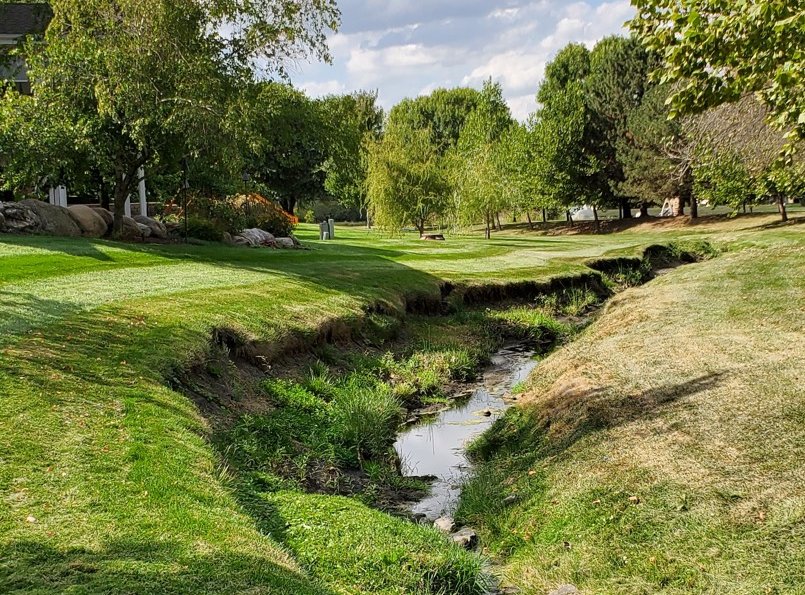 Forest Lake Flood Risk Reduction
Forest Lake Flood Risk Reduction
Additional information regarding these improvement projects and other Watershed Management projects can be found on the City of Lincoln Watershed Management website at lincoln.ne.gov/WatershedProjects.
In this permit term, the Health Department conducted inspections at 22 municipal facilities that are required to be inspected under EPA’s “Good Housekeeping” program. (see Figure 6 (PDF, 779KB)).
(PDF, 779KB)).
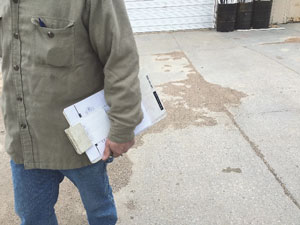 Municipal Inspections are conducted annually by the Health Department
Municipal Inspections are conducted annually by the Health Department
Ninety-eight industrial facilities were inspected for compliance with State of Nebraska issued NPDES permits. One of the Mayor's Performance Indicators for Water Quality is to assure that at least 90% of industries pose minimal risk of illicit discharge to the stormwater system. In FY22-23, 97% of the facilities posed minimal risk of illicit discharge. For the past six years, this performance indicator has been achieved. (see Figure 7 (PDF, 786KB)).
(PDF, 786KB)).
The State approved utilizing Best Management Practices (BMP) monitoring for our wet weather monitoring for this permit term. This year was the fifth and final year of a five-year permit. Overall data analysis is provided as part of the final BMP Monitoring report.
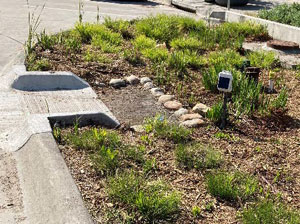 P Street - Outflow Sampling
P Street - Outflow Sampling
BMP sites selected for BMP monitoring include Planters at the Municipal Service Center; Tyrrell Park Regional Bioretention Area; Tyrrell Park – Permeable Paver Cul-de-Sac; 11th Street Streetscape – 11th & G Bioretention Cell; and the P Street Streetscape – P Street & Centennial Mall Bioretention Cell.
Based on final results of the data analysis, some of the sites will change in the upcoming permit term.
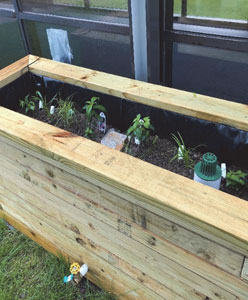 Planter at Municipal Service Center (MSC)
Planter at Municipal Service Center (MSC)
Figures
PDF format 
- Figure 1 - Dry Weather Monitoring Locations(PDF, 786KB)
- Figure 2 - Illicit Discharge Complaints/Response Locations(PDF, 923KB)
- Figure 3 - Erosion and Sediment Control(PDF, 900KB)
- Figure 4 - Grading Inspection Locations(PDF, 914KB)
- Figure 5 - Basin Inspections(PDF, 840KB)
- Figure 6 - Municipal Facility Inspections(PDF, 779KB)
- Figure 7 - Industrial Inspections(PDF, 786KB)
- Figure 8 - Post Construction BMP Inspection(PDF, 866KB)
- Figure 9 - Cost Share Projects(PDF, 882KB)
- Figure 10 - Cost Share Rain Gardens 2007 - 2023(PDF, 915KB)
- Figure 11 - Illicit Discharge Complaints/Response Locations on State of NE / UNL Property(PDF, 943KB)
Report PDF (PDF, 3MB)
(PDF, 3MB)